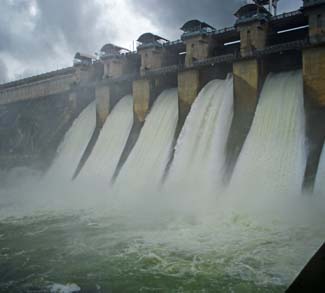Ever since the attacks on the Indian Army base at Uri by four terrorists identified by India as members of the Pakistan based terrorist group Jaish-e-Mohammed, there has been a growing demand by the Indian public that its government must act tough on Pakistan. Of the various options mooted, one of them was to revisit the Indus Water Treaty in order to send Pakistan a strong message. Although the public outrage has relatively eased after the Indian Army conducted surgical strikes across the Line of Control to dismantle terror launch-pads in PoK, the Indus Water Treaty nevertheless continues to be discussed in the broader discourse. While some have called for abrogation of the lopsided treaty, others have suggested India should make full use of the waters, which it has not done so far, within the provisions of the treaty. But any evaluation of this matter must be cognisant of both these facts: the treaty is grossly unfair to India, and there is no tap that can be turned off to stop the Indus waters.
Signed in 1960 by Indian Prime Minister Jawaharlal Nehru and Pakistan’s President at the time Ayub Khan, the Indus Water Treaty was brokered by the World Bank. It is an extraordinarily generous water-sharing treaty, and is the only pact in the world that compels the upper riparian state to defer to the interests of the downstream state. The treaty gives Pakistan control over the three so-called ‘western’ rivers of Indus, Jhelum, and Chenab that flow from the Indian state of Jammu & Kashmir before entering Pakistan. On the other hand, India gets to control the three eastern rivers of Ravi, Beas and Sutlej that flow from the Indian state of Punjab. This parity in the number of rivers is, however, quite misleading. The three rivers that India gets to control have awfully low volume of waters compared to the other three. In all, Pakistan gets a whopping 5,900 tmcft volume of water every year which is a massive 80.5% share of the total waters, while India gets to use only 19.5%.
What’s ironic is that Pakistan gobbles up all of this water even though its actual requirement is much less. It is egregious that annually about 40 million acre feet (maf) of water flows into the Arabian Sea absolutely unutilised, according to a study by an Indian Supreme Court Advocate. If even some of these waters were allowed to be utilised by India, the water shortage in the states of Haryana, Punjab, and Rajasthan could probably be solved. Further, the Indian state most affected by the treaty is Jammu and Kashmir. The people and government of Jammu and Kashmir have time and again raised this issue. In 2002, the state assembly passed a unanimous resolution demanding the abrogation of the pact, when Mufti Mohammed Sayeed was the Chief Minister. Given the power shortages in the state, full access to Indus waters has the ability to boost self-reliance which is key to solving the state’s problems. Pakistan however has a vested interest in continuing the status quo because it harms the people of Jammu and Kashmir and undermines their economic growth.
Even though under the treaty India has the right to ‘non-consumptive’ use of the western three rivers, which is for purposes such as hydro power generation and even storage up to 3.6 million acre feet, India has hardly made any use of these waters, allowing Pakistan to benefit from the surplus. Even for the few projects that India has undertaken such as the Kishanganga and Ratle projects (well within the treaty framework), Pakistan has unabashedly taken them to international arbitration over petty objections, in effect stalling the projects resulting in obvious implications such as cost overruns. Meanwhile as the Indian projects are halted, Pakistan itself is busy erecting dams to make its case stronger. Ironically, China too has stealthily built a dam on the Indus at Demchok in Ladakh.
The Indus Water Treaty came into recent spotlight when the spokesperson for India’s Ministry of External Affairs Vikas Swarup hinted at a press briefing on September 22 that India may revisit it. “I am sure you are aware that there are differences between India and Pakistan on the implementation of the Indus Waters Treaty,” he said before adding that the issue is being addressed bilaterally and that all cooperative measures call for mutual trust and goodwill on both sides. “For any such treaty to work, it is important there must be mutual trust and cooperation. It can’t be a one-sided affair,” Swarup said.
Largesse, be it in the case of river waters or other resources like land, marine resources, etc., is not uncommon in diplomacy. India has a proven track record of making magnanimous overtures to its neighbours. The recent land boundary agreement with Bangladesh is a fine example of how India is willing to walk the extra mile if the partner country is able to reciprocate with a sense of goodwill and positivity. But Pakistan is no Bangladesh or Bhutan.
There is neither mutual trust nor goodwill, which were the foundational basis of the Indus Water Treaty, between India and Pakistan today. For 56 years of uninterrupted and unquestioned flow of waters from India to Pakistan, all India has got in return is the blood of its citizens. As Indian strategic affairs expert Brahma Chellaney wrote in his recent article, “If India jettisons the 1960 Indus Waters Treaty (IWT), it can fashion water into its most potent tool of leverage to mend Pakistan’s behaviour. Pakistan has consistently backed away from bilateral agreements with India – from the Simla Agreement, to the commitment not to allow its territory to be used for cross-border terrorism… It cannot selectively demand India’s compliance with one treaty while it flouts a peace pact serving as the essential basis for all peaceful cooperation, including the sharing of river waters.” Chellaney has also pointed out that Pakistan’s use of state-reared terrorist groups can be invoked by India, under Article 62 of the Vienna Convention on the Law of Treaties, as constituting reasonable grounds for withdrawal from the Indus treaty.
The Indian government has for now not decided to abrogate the treaty, but would be ‘maximising’ the use from the western waters under the ambit of the treaty. In a high-level review meeting, Prime Minister Modi has said that “blood and water cannot flow at the same time,” indicating a firm stance. The government has also decided to suspend the meeting of Indus Water Commission until further notice, pointing out that such engagements need an atmosphere free from terror. Pakistan must realise that if it does not mend its ways and stop cross-border terrorism, India could escalate further. With every misadventure Pakistan undertakes, the costs will be raised by India. The Indian government’s signal to Pakistan is clear – it is not going to be business as usual if Pakistan continues to bleed India.
Kamal Madishetty is a research associate at Vision India Foundation, New Delhi. He is an alumnus of IIT Guwahati and Jindal School of International Affairs, Haryana. Twitter handle: @KamalMadishetty
The opinions, beliefs, and viewpoints expressed by the authors are theirs alone and don’t reflect any official position of Geopoliticalmonitor.com.




